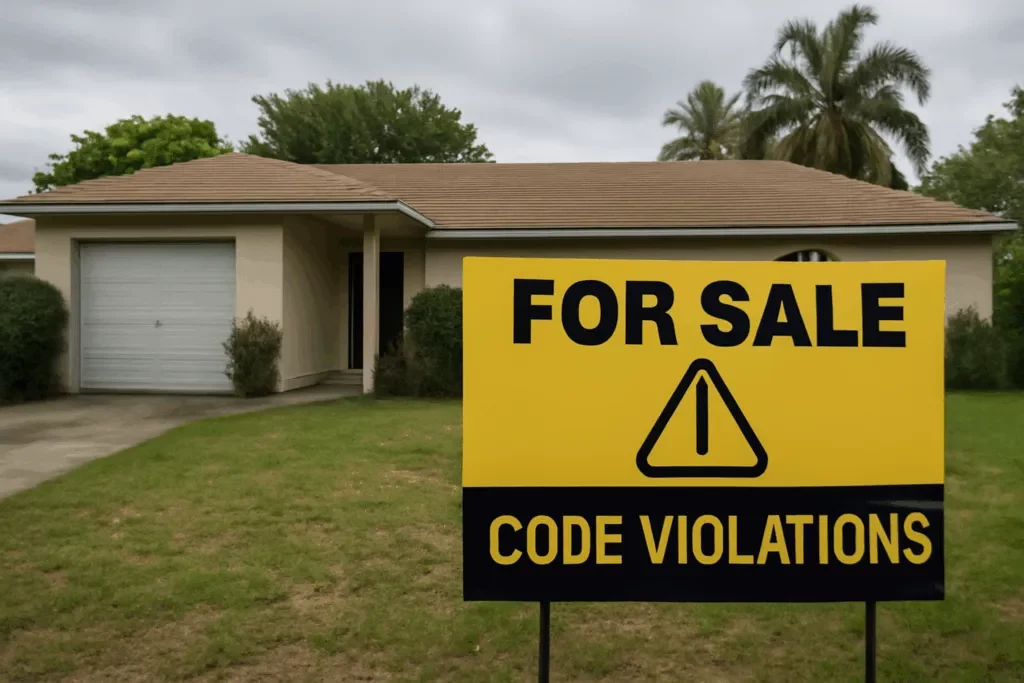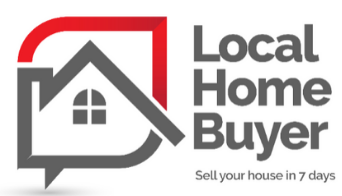Introduction
If you’re searching for “Can I Sell My House Fast with Code Violations in Washington DC?” you’re likely feeling overwhelmed by the potential costs and complications of selling a home that isn’t in perfect condition. You may be concerned about the impact of code violations, such as zoning, safety, or structural issues, on the sale price or the process itself. Perhaps you’ve been unable to fix the violations due to financial or time constraints and are worried about whether it’s even possible to sell your home without making expensive repairs. You’re likely looking for the fastest, easiest, and most cost-effective way to sell your house, and you may be wondering if there are buyers out there who will be willing to purchase it “as-is.” Most importantly, you want to understand all your options, from fixing violations before the sale to selling to real estate investors, and you want advice on the best course of action for a quick and hassle-free sale.
Can I Sell My House Fast with Code Violations in Washington DC?

Selling a house with code violations in Washington DC might seem complicated, but it’s entirely possible. Whether your home has issues with zoning laws, building permits, or safety violations, selling your house fast can still be a viable option. In this guide, we’ll explore how you can sell your home despite having code violations and what steps you can take to ensure a smooth process.
What Are Code Violations?
Before diving into the process of selling a house with code violations, let’s first define what code violations are and why they matter.
Definition of Code Violations
Code violations occur when a property does not comply with the building or safety codes set by local government authorities. These violations can include structural issues, plumbing problems, electrical hazards, and much more.
Common Types of Code Violations in Washington DC
- Zoning Violations: Unauthorized use of property, such as operating a business in a residential area.
- Building Code Violations: Issues with the structure or condition of the property, such as faulty foundation work or unsafe additions.
- Safety Violations: Non-compliance with safety standards, such as missing fire exits or handrails.
- Electrical and Plumbing Violations: Unsafe installations or repairs that pose risks to the safety of the home.
Understanding these violations will give you insight into what potential buyers will be looking at when considering purchasing your home. If your house has these issues, they can reduce the overall value and desirability of the property, but the good news is that selling it is still an option.
For more information on zoning and building codes in Washington DC, check out the official DC Construction Codes by the Department of Buildings.
Can You Sell a House with Code Violations in Washington DC?
Yes, You Can Sell Your House!
Even with code violations, selling your house fast in Washington DC is possible. While some buyers may hesitate due to the cost and complexity of repairing the violations, others—especially real estate investors—are experienced in purchasing homes with these types of issues. The key to a successful sale is transparency. You must disclose any known violations to potential buyers to avoid legal complications and to ensure the process goes smoothly.
Your Options for Selling
- Sell As-Is
Selling “as-is” means you won’t make any repairs. This is a great option if you don’t have the time or resources to fix the issues yourself. Investors are often interested in homes with code violations and may purchase them for cash, speeding up the sale process. - Fix the Violations
If you want to sell your house to a traditional buyer or for a higher price, addressing the violations may be necessary. However, this could delay your sale, as repairs can take time and money. You may want to consult an expert, like this HomeAdvisor Guide to Home Repairs to get an estimate on the cost of fixing various code violations. - Sell to a Real Estate Investor
Investors often buy homes in poor condition, including those with code violations. They offer fast sales, typically closing in 7-14 days, and do not require you to make repairs. This is an excellent option for those who want a quick sale and prefer not to deal with the hassle of repairs.
How Code Violations Impact Your Home Sale
Potential Impact on Sale Price
Code violations can lower your home’s value significantly, as buyers will factor in the costs and effort required to address the issues. For example, a zoning violation might be costly to fix, while a safety violation could render the property uninhabitable until it’s addressed. However, some buyers are still willing to purchase homes at a discount, making this a possible solution for sellers who want a fast sale.
Difficulty in Securing Financing
If you’re planning to sell to a traditional buyer who relies on a mortgage, securing financing could be challenging. Lenders are often hesitant to approve loans for homes with code violations, especially if they involve safety issues that could impact habitability. This is another reason why selling to an investor might be your best option.
How to Sell Your House Fast with Code Violations
Selling your house fast with code violations doesn’t need to be a stressful experience. Here’s a step-by-step guide to help you navigate the process:
- Be Transparent About the Violations
When you’re selling a house with code violations, honesty is key. Always disclose any known issues upfront. This helps build trust with potential buyers and prevents surprises that could delay the sale later on. - Consider Selling As-Is
If you don’t have the resources to fix the violations, selling “as-is” may be your best option. Investors who buy houses in any condition will often pay in cash, meaning you can close quickly and avoid the hassle of repairs. - Work with Investors Specializing in Problem Properties
Real estate investors who specialize in buying homes with code violations understand the challenges and risks associated with these properties. They can offer a quicker, smoother transaction compared to traditional buyers and are usually less concerned about violations. Investors are often open to negotiating a fair price based on the home’s condition. - Offer an Attractive Price
If you are selling on the open market, offering an attractive price may help you sell your house faster despite the violations. Consider offering a discount that reflects the cost of repairs that the buyer will need to invest in.
Is It Worth Fixing Code Violations Before Selling?
You may be wondering whether it’s worth fixing the violations before selling, and the answer depends on several factors.
Pros of Fixing Violations Before Selling
- Higher Sale Price
Addressing code violations could increase your home’s market value, as it may become more attractive to traditional buyers who can secure financing. - Easier to Secure Financing
Homes that are in compliance with building codes are easier for buyers to finance. If you can address the issues, you may attract buyers who would otherwise be unable to purchase your home. - Faster Sale
A house in good condition may sell faster, as there will be fewer obstacles in the way of closing the deal.
Cons of Fixing Violations Before Selling
- Costly Repairs
Fixing code violations can be expensive. For example, correcting electrical issues might cost several thousand dollars, while fixing structural damage could cost even more. - Delays in Closing
Repairing violations can delay the sale, especially if contractors need time to complete the work. This might not be ideal for someone looking to sell quickly. - Uncertain ROI
The return on investment for repairs may not always justify the cost. In some cases, the amount you spend on fixing violations might not result in a proportionate increase in the sale price.
For a firsthand account of the as-is selling experience, including personal challenges and strategies, check out this insightful article on Bankrate.
Selling to Real Estate Investors
Why Real Estate Investors are a Good Option
Real estate investors specialize in buying homes in poor condition, including those with code violations. Investors typically offer to purchase homes as-is, saving you from the hassle and expense of repairs. If you need to sell fast, an investor can offer a quick, all-cash deal, often closing in just 7-14 days.
Homeowners dealing with code violations often find that working with experienced cash buyers makes the process far less stressful. Established companies like Shamrock Home Buyers focus on purchasing properties in as-is condition, allowing sellers to avoid costly repairs, compliance delays, and traditional financing obstacles. This approach is especially helpful when speed and certainty are top priorities.
Faster Closings
Investors are known for their ability to close deals quickly. If you’re in a hurry to sell your house due to financial hardship, a looming foreclosure, or a move to a new city, working with an investor can expedite the process.
No Repairs Needed
One of the greatest advantages of selling to an investor is that you don’t have to worry about making any repairs. The investor will take on the cost of repairing the violations, allowing you to walk away without any further financial burden.
Potential Consequences of Code Violations on the Sale Process
Legal and Financial Risks
Failure to address code violations before selling your home can lead to financial penalties, as local authorities may issue fines for unresolved violations. Furthermore, buyers may hold you liable for not disclosing these violations during the sale.
Impact on Closing
Code violations can delay the closing process, especially if additional issues are uncovered during inspections. However, if you sell to an investor, this risk is minimized, as investors typically don’t require inspections or repairs.
Table: Comparison of Selling Methods with Code Violations
| Method | Pros | Cons |
|---|---|---|
| Sell As-Is | Fast, no repairs needed, easy for investors to buy. | Potentially lower sale price. Buyers may need to secure financing. |
| Fix the Violations | Can increase property value, easier financing for buyers. | Expensive repairs, may delay sale. |
| Sell to a Real Estate Investor | Quick sale, no repairs, investors specialize in problem properties. | Potentially lower sale price. Less control over the selling process. |
Frequently Asked Questions
1. Can I sell my house if it has code violations in Washington DC?
- Answer: Yes, you can sell your house even if it has code violations. While the presence of violations may affect the sale price and financing options, you can sell the house “as-is” to real estate investors who specialize in buying homes in poor condition. It’s important to disclose any known violations upfront to avoid future legal complications.
2. Do I have to fix code violations before selling my house in Washington DC?
- Answer: No, you don’t have to fix code violations before selling your house in Washington DC. You can sell your house “as-is” to real estate investors who are experienced in dealing with properties that have code violations. However, fixing violations can increase your home’s market value and make it easier to secure financing for traditional buyers.
3. How do code violations affect the sale price of my house?
- Answer: Code violations can lower the sale price of your home, as buyers may need to factor in the cost of repairs. The severity of the violations, such as structural or safety issues, will determine the extent of the price reduction. Selling to an investor may allow for a faster sale, but the price may still be lower than if the property were in good condition.
4. Can I still get financing if my house has code violations?
- Answer: It may be difficult for traditional buyers to secure financing if your house has code violations, especially if they affect the habitability of the home. Lenders may be hesitant to approve mortgages for homes with significant safety or structural violations. If financing is a concern, selling to an investor who offers cash may be the best option.
5. What are the benefits of selling a house with code violations to a real estate investor?
- Answer: Selling to a real estate investor has several benefits. Investors typically buy homes “as-is,” meaning you won’t have to make any costly repairs. The sale process is often faster, with some investors closing in as little as 7-14 days. Investors are also more flexible and willing to buy properties with code violations, making them a good choice if you want to sell quickly without worrying about repairs or inspections.
6. How long does it take to sell a house with code violations in Washington DC?
- Answer: The time it takes to sell a house with code violations can vary. If you sell “as-is” to a real estate investor, the process can be completed in as little as 7-14 days. However, if you choose to fix the violations before selling, the process could take much longer, depending on the extent of the repairs required.
7. What should I do if I can’t afford to fix the code violations on my property?
- Answer: If you can’t afford to fix the code violations, selling “as-is” to a real estate investor is likely your best option. Investors specialize in buying distressed properties and will handle the repairs themselves. You can sell your home quickly and avoid the financial burden of making repairs.
8. Are there any risks to selling a house with code violations?
- Answer: The main risks of selling a house with code violations include legal issues if you don’t disclose the violations upfront, and the possibility of a lower sale price. Additionally, if you sell to a traditional buyer, they may struggle to secure financing due to the violations. However, selling to an investor mitigates many of these risks, as they typically buy homes with code violations and offer fast, all-cash deals.
9. What types of code violations are most common in Washington DC?
- Answer: Common code violations in Washington DC include zoning violations, building code violations, safety violations (such as missing handrails or fire exits), and electrical or plumbing issues. Each type of violation can affect the safety, habitability, and value of the home.
10. How can I ensure a smooth sale of my house with code violations?
- Answer: To ensure a smooth sale, be transparent with potential buyers about any code violations. If you choose to sell to an investor, this process will typically be faster and easier. However, if you decide to fix the violations before selling, make sure to get the necessary permits and approvals to avoid delays.
Final Thoughts: Can You Sell Your House Fast with Code Violations?
At Local Home Buyer, we understand that dealing with code violations can be overwhelming and stressful, especially when you’re looking to sell your home quickly. While selling a house with code violations in Washington DC might seem daunting, it’s important to remember that you do have options. Whether you choose to repair the violations or sell your house as-is, working with the right buyer can make all the difference in the process.
If you’re looking for a fast, hassle-free sale, selling your house to us at Local Home Buyer could be your best option. We specialize in buying homes in any condition, including those with code violations. When you sell to us, you don’t need to worry about costly repairs or prolonged negotiations. We can make you a fair, all-cash offer and close the deal in as little as 7-14 days, allowing you to move forward without the stress of dealing with repairs or inspections.
The key is understanding that you don’t have to go through the lengthy and expensive process of fixing code violations. Local Home Buyer makes it easy to sell your house fast, even with violations, so you can move on with your life. Contact us today to learn how we can help you sell your house quickly and efficiently, no matter the condition.

